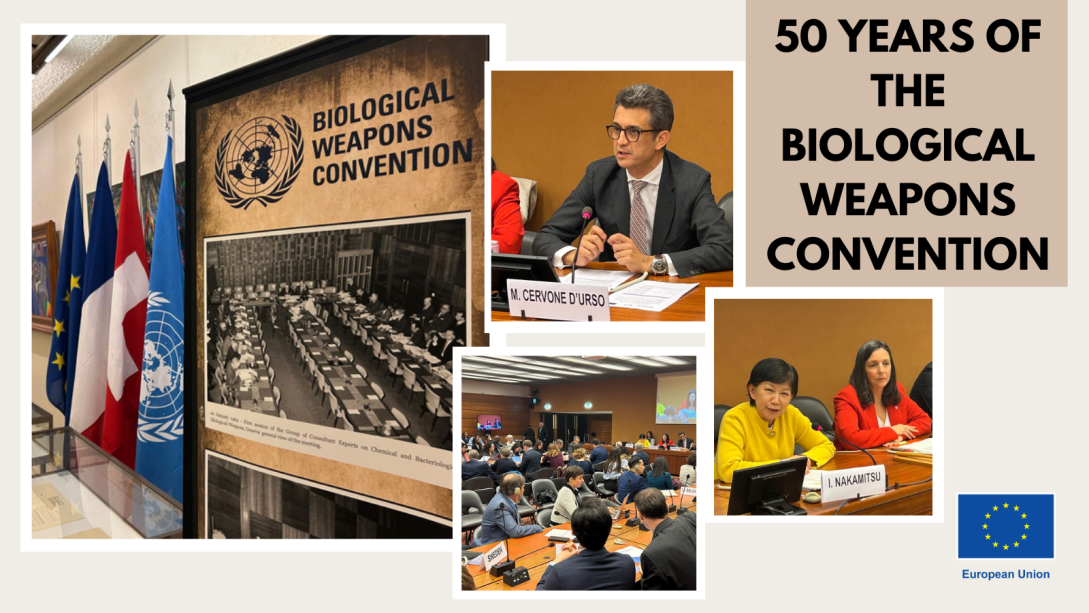50th Anniversary of the BWC: The Past, Present and Future of the Biological Weapons Convention

The Biological and Toxin Weapons Convention (BWC) entered into force 50 years ago - a treaty that has safeguarded humanity from the devastating consequences of biological warfare.
UNODA Under-Secretary-General and High Representative for Disarmament Affairs Ms. Izumi Nakamitsu held the opening remarks together with Ambassador Michele Cervone d’Urso, Deputy Head of the European Union Delegation.
Today’s event is not just a celebration of the Convention’s longevity; it is an opportunity to reflect on its achievements and, crucially, to discuss ways to strengthen the Convention for the future. | Izumi Nakamitsu, UN Under-Secretary-General and High Representative for Disarmament Affairs
Ms Nakamitsu thanked the EU for its co-organisation and underlined that the EU has consistently supported the Convention’s implementation, providing both political and financial support for its strengthening.
The Convention was the first multilateral treaty to ban an entire category of weapons of mass destruction, setting a global norm that remains as vital today as it was in 1975. For half a century, the BWC has stood as a pillar of the global disarmament and non-proliferation framework, preventing the development, production, and use of biological weapons.
| EU Ambassador Cervone d’Ursu, Deputy Head of the EU Delegation in Geneva
In his opening remarks, Ambassador Michele Cervone d'Urso reaffirmed the EU's commitment to the BWC as a key player in enhancing biosafety, strengthening national capacities and fostering regional cooperation, while calling for the mechanisms to evolve the BWC to meet today’s rapidly changing scientific and technological landscape.
The EU has been a leader in strengthening and universalising the BWC for decade, providing financial and technical assistance to States Parties and funding key initiatives such as the Implementation Support Unit (ISU).
On the occasion of the 50th anniversary of the Convention, the EU welcomed Micronesia, Tuvalu and the Comoros as the newest States Parties.The increasing engagement of countries of the Global South is a testament to the BWC’s relevance in strengthening biosafety, biosecurity, and international cooperation worldwide.
Yet, while we celebrate the achievements of the past, we must recognize that the BWC must evolve to meet today’s rapidly changing scientific and technological landscape. | EU Ambassador Cervone d’Ursu, Deputy Head of the EU Delegation in Geneva
As advancements accelerate, the BWC must evolve to remain effective.
In this context, the 9th BWC Review Conference outlined two key mechanisms:
- A Science and Technology Review Mechanism to provide “impartial, expert-driven assessments”
- An International Cooperation and Assistance Mechanism to “enable States Parties to exchange knowledge and develop peaceful applications of biological science”
The EU asserts that preparations for these mechanisms have reached a level of maturity justifying taking them forward through a Special Conference, reinforcing the BWC’s effectiveness in preventing biological threats, ensuring scientific responsibility, and strengthening global security. In parallel, the EU CBRN Centres of Excellence Initiative plays a key role in enhancing biosecurity, strengthening national capacities, and fostering regional cooperation.
The BWC must not only endure but be strengthened
| EU Ambassador Cervone d’Ursu, Deputy Head of the EU Delegation in Geneva
As the Convention marks its 50th anniversary, the EU calls to action for its future. Emphasizing its commitment to a stronger, more resilient BWC for future generations, the EU urges partners to ensure the treaty remains fit for purpose in the 21st century.
A cornerstone of global security
In a statement on the occasion of the 50th anniversary of the BWC, EU High Representative/Vice President Kaja Kallas underlined the role of the BWC as a 'cornerstone of global security'. She reaffirmed that the EU will continue to consistently and tirelessly promote the universalisation, confidence-building measures, and strengthening of the Convention.
With 188 States Parties today, the BWC was the first multilateral treaty to ban an entire category of weapons of mass destruction, establishing stringent international norms against their development, production, acquisition, transfer, stockpiling and use.
All States not yet party to the Convention should join without delay—universal adherence is essential to addressing both traditional and emerging biological threats.





